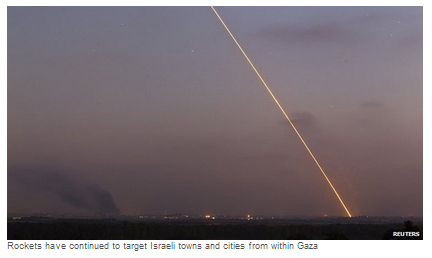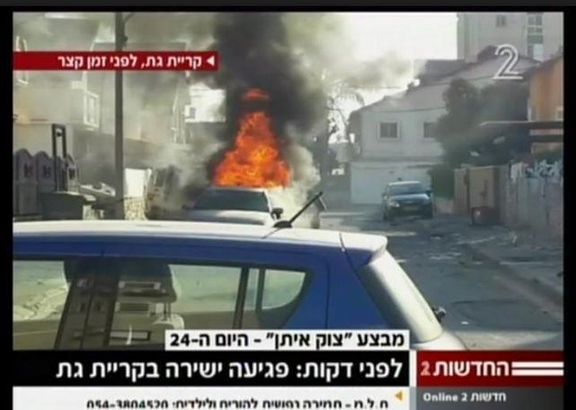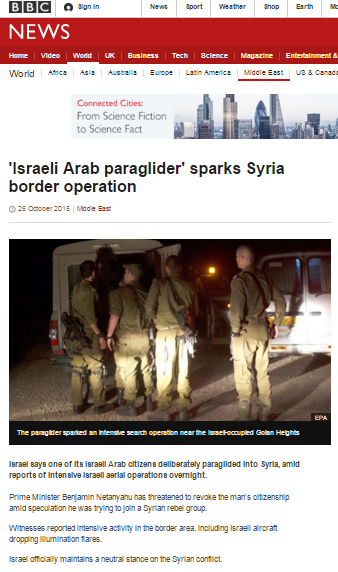The image above was shown on Israel’s Channel 2 news shortly after a missile fired from the Gaza Strip hit a home in Kiryat Gat at around 6 p.m. on July 31st.
“Two people wounded by rocket-fire in Kiryat Gat; one, a 30-year-old man, was hospitalized in serious condition. The rocket, one of several shot at the southern city, struck the third floor of a residential building. Three other rockets were intercepted above Kiryat Gat, and another landed in an open area within the city limits. Seven people are being treated for shock.”
That missile was one of 76 to hit Israel on that day, with a further 17 intercepted by the Iron Dome missile defence system and 102 fired overall. The day before – July 30th – 140 missiles had been fired at Israel and the day after – August 1st– over sixty were launched. On August 2nd 86 missiles were fired from the Gaza Strip by terrorist organisations and the following day – August 3rd – 119 missiles were launched.
So how has this continuing missile fire at Israeli civilians been covered on the BBC News website?
The later of two articles appearing on the BBC News website on July 30th – titled “Gaza conflict: UN accuses Israel over Jabaliya attack” – covers the topic of 140 missiles fired from the Gaza Strip on that day as follows:
“Sirens continued to sound in southern Israel to warn of militant rocket attacks….”
An earlier report from the same date relates only to missile fire from the previous day.
An article titled “Gaza conflict: Israel calls up 16,000 reserve soldiers” which was published on the BBC News website’s Middle East page on the morning of July 31st – the day after 140 missiles had been fired from the Gaza Strip – likewise has no mention of missiles hitting Israel at all; only of sirens sounding.
“At least 19 air strikes were carried out overnight, officials said, while rocket alarm sirens were heard in southern Israel on Thursday morning.”
An article appearing on the BBC News website’s Middle East page later on in the day on July 31st under the title “Israel ‘to destroy’ Hamas Gaza tunnels – Netanyahu” was last updated about an hour after that attack on Kiryat Gat but the incident was not reported. The only mentions of missile fire at Israeli civilians in that article are these:
“Most of Hamas’ rockets into Israel are intercepted and destroyed by Israel’s Iron Dome missile defence system.” […]
“Meanwhile, a series of rocket alert sirens sounded across southern Israel. Sirens in the town of Sderot sounded several times as Mr Netanyahu spoke.”
The morning of August 1st saw a new article on the BBC News website’s Middle East page titled “Gaza 72-hour humanitarian truce by Israel and Hamas begins“. From midnight until the ceasefire came into effect at 08:00 local time, at least nine missiles had been fired from the Gaza Strip and just two hours into it, missiles were fired at the Kerem Shalom area. The only two references to missile fire in that article are these:
“However, hours after the truce began, Palestinians said four people had been killed by Israeli fire, apparently in response to a rocket attack.” […]
“Israeli military sources told the BBC the attack was in response to rocket fire on Kerem Shalom in Israel.”
In a later article from the same day titled “Israel to resume Gaza operation as truce with Hamas crumbles” the sole reference to missile fire comes in a quote from an Israeli spokesman.
“Israeli foreign affairs spokesman Yigal Palmor told the BBC that Israeli forces had retaliated after being attacked in what seemed like a planned move by Hamas.
“There was a full-scale attack on an Israeli unit and this unit had to respond,” he said.
“After it responded, Hamas started firing rockets on Israeli territory again and therefore the fighting resumed all along the line.”
The third and final article appearing on August 1st – inaccurately titled “Gaza militants ‘seize Israeli soldier’ as ceasefire ends” – includes no mention at all of missile fire into Israel even though earlier in the evening (just before 9 p.m. local time) it had been announced that over sixty missiles had been fired at Israeli civilians from the Gaza Strip throughout that day.

Three written reports also appeared on the BBC News website’s Middle East page on August 2nd. The earliest – titled “Gaza conflict: Hamas denies holding Israeli soldier” includes only the following reference to missile fire by terrorist groups in the Gaza Strip.
“Hamas accused Israel of breaking the short-lived ceasefire but the Israel Defense Forces (IDF) said it had been forced to respond to militant rocket fire.”
The second article to appear on that day was titled “Gaza conflict: New exchanges amid Israeli soldier hunt“. During the course of that day, 86 missiles were fired from Gaza, of which six were intercepted and 58 hit Israel. By the time this article was published, there had already been two barrages of missiles fired at central Israel and the Be’er Sheva area at 06:00 and 07:20. The article states:
“A series of rocket attacks into Israel was reported on Saturday morning.”
And:
“Israeli media said that after a relatively quiet night, a number of rockets had been fired on Saturday morning, including at Tel Aviv.
The Qassam Brigades, the armed wing of Hamas, which controls Gaza, said it had fired three rockets at Tel Aviv.
At least two were reportedly shot down by the Iron Dome missile defence system.”
The third article appearing on August 2nd was titled “Gaza crisis: Israel ‘unlikely to go to talks in Egypt‘” and its coverage of 86 missiles fired that day is confined to the following sentence:
“Israeli media said that after a relatively quiet night, a number of rockets had been fired on Saturday morning, including at Tel Aviv.”
On August 3rd a total of 119 missiles were fired from the Gaza Strip at Israeli civilian targets, eight of which were intercepted and 109 hit Israel. The BBC News website’s Middle East page main article on that day was titled “Gaza conflict: Missing Israeli soldier Hadar Goldin ‘dead’“. Its coverage of the topic of missile attacks against Israeli civilians is limited to one sentence.
“Israeli media also reported fresh militant rocket attacks into Israel.”
An additional article appearing later on the same day was titled “Gaza crisis ‘intolerable’, says Philip Hammond“. That article’s coverage of 119 missiles fired by terrorists in the Gaza Strip is as follows:
“Thirty Palestinians have been reported killed on Sunday and militants have continued to fire rockets into Israel.”
Readers may recall that just days ago the BBC complaints department informed a member of the public that:
“BBC News has reported extensively on the series of rocket attacks launched by Hamas and other Palestinian militants into southern and central Israel in recent weeks. We have reported on the civilian injuries and casualties, destruction and disruption caused by the attacks in towns near Gaza, such as Ashkelon and Sderot. We have also reported on the range and capability of Hamas’ arsenal, emphasising that major urban areas like Tel Aviv and Jerusalem are also under threat from attacks.” [emphasis added]
Clearly the hundreds of missiles launched from the Gaza Strip in the five days between July 30th and August 3rd inclusive were not reported “extensively” on the BBC News website and the effects of those which exploded inside Israel were not reported at all. Visitors to the BBC News website hence not only have little idea of what is happening on the civilian front in Israel, but they also lack the context to understand the Israeli strikes on missile launchers, weapons depots and terrorist cells in the Gaza Strip which are extensively reported by the BBC.
Part two of this article will look at BBC television news coverage of the same events by correspondents based in Israel.





